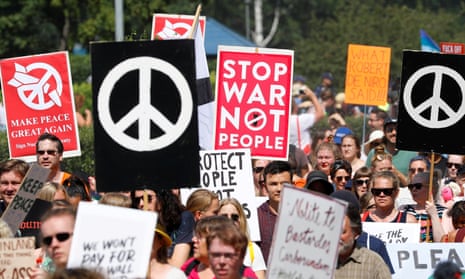The Finns are proud of hosting some of the cold war’s most historic summits. But many in the country will tell you: don’t call Helsinki “neutral ground”.
Protesters came out on Sunday to attack both Donald Trump and Vladimir Putin before the controversial summit between the two leaders in the Finnish capital.
“Not welcome,” read one sign, held by Hemmo Siponen, showing a cartoon of Trump and Putin embracing. “Fuck you both,” read another carried by two young women.
“It doesn’t feel good to have them here,” said Anna Bruun, a civil servant who said she was opposed to “great power politics” playing out in her home city.
The country’s largest newspaper has put up English- and Russian-language street adverts saying: “Mr President, welcome to the land of free press.”
Helsinki often served as a crucial bridge between the Soviet Union and the US during the cold war. The city was the venue for the 1975 Helsinki accords in which Gerald Ford and Leonid Brezhnev signed a 35-state declaration that called for respect of sovereign territory and human rights. Other notable summits included George Bush and Mikhail Gorbachev in 1990, and Bill Clinton and Boris Yeltsin in 1997.
“If the result is something in the tradition of those agreements, then it could be very positive, but if it’s something that becomes Munich-Yalta-Helsinki, then that would be catastrophic,” Laura Saarikoski, the US correspondent for the Finland daily newspaper Helsingin Sanomat, said, referring to talks synonymous with appeasement.
Saarikoski and a colleague published an open letter in the newspaper on Sunday that praised the “spirit of Helsinki” as a summer setting conducive to talks, but showed that the hosts would also have their say.
“Hopefully everyone will nevertheless understand that European matters can no longer be agreed on over the heads of Europeans,” the letter read.
Many here recall the forced Soviet-era neutrality, a policy called Finlandisation, as a dark period in the country’s history.
Finland has established its western credentials in the years since the fall of the Soviet Union, with EU membership and an enhanced partnership with Nato.
“Finns don’t view themselves as being neutral between east and west,” said Mika Aaltola of the Finnish Institute of International Affairs. “Since the end of the cold war, the policy has been that Finland is part of the west. We have built a society that is very solid and unified, world class in terms of many rankings, as a way of getting out of the geographical bind we found ourselves in.”
Russia still maintains some strong ties with Finland. Putin has met regularly with the country’s last two prime ministers, and a close associate, Boris Rotenberg, holds Finnish citizenship and business interests in the country. Russia is also the source of important energy projects in the region, including a nuclear power plant and gas pipeline.
“I support open dialogue,” said Hemmo Siponen, a protester. “But that should be done in the open. I don’t want backdoor talks to be held here.”
